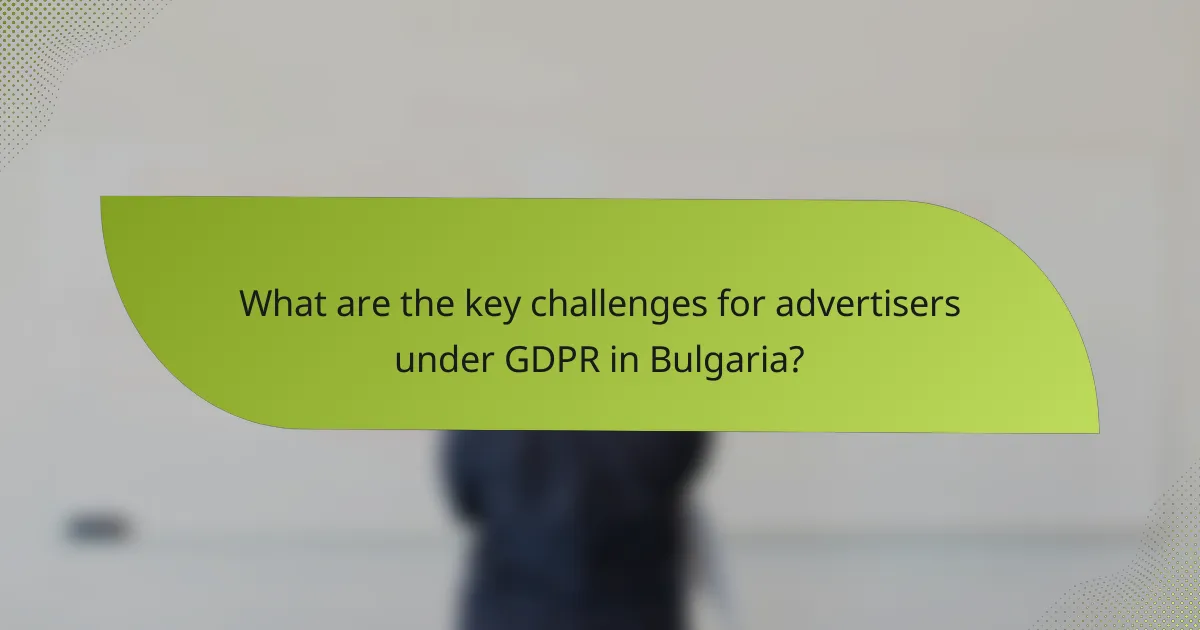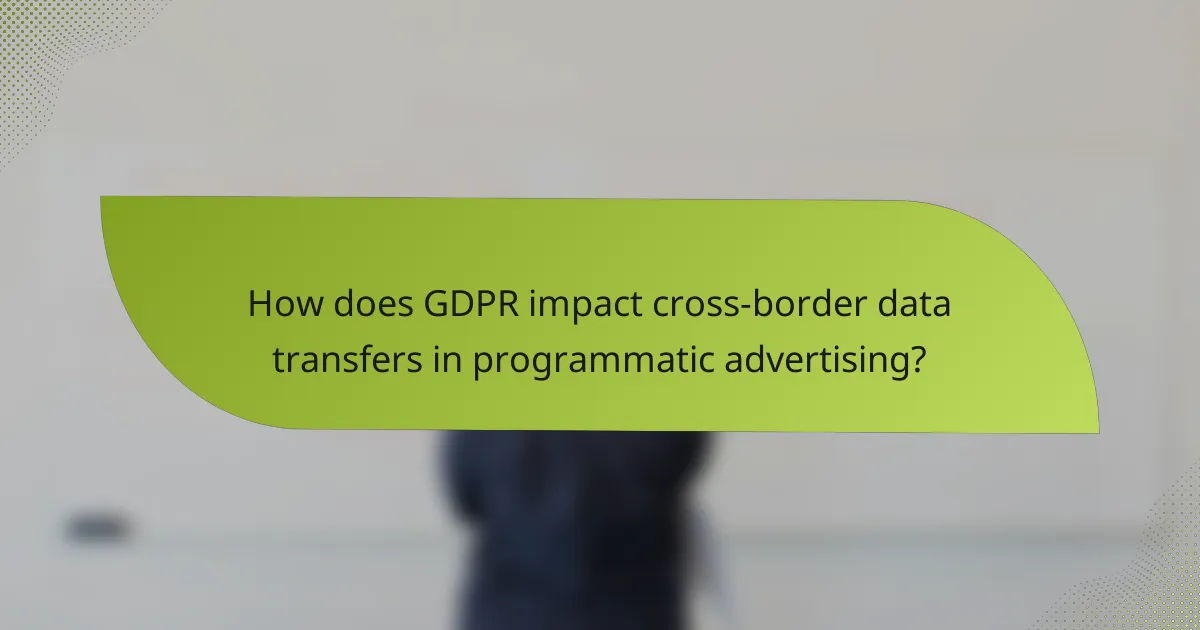The General Data Protection Regulation (GDPR) has significantly influenced programmatic advertising practices in Bulgaria by imposing stricter data protection requirements. Advertisers must navigate complex legal frameworks and ensure compliance, particularly in obtaining and managing user consent, which can impact the effectiveness of their advertising efforts.

How has GDPR affected programmatic advertising in Bulgaria?
The General Data Protection Regulation (GDPR) has significantly influenced programmatic advertising practices in Bulgaria by imposing stricter data protection requirements. Advertisers must now ensure compliance with these regulations, which affects how they collect and use consumer data for targeted advertising.
Increased compliance costs
GDPR compliance has led to higher operational costs for companies involved in programmatic advertising in Bulgaria. Organizations must invest in legal consultations, data protection officers, and compliance training to meet the regulatory standards.
These costs can vary widely, with some businesses reporting increases in compliance-related expenses by tens of percent. Smaller companies may feel the financial strain more acutely, as they often lack the resources to absorb these additional costs.
Changes in data collection practices
Under GDPR, data collection practices in Bulgaria have shifted towards greater transparency and user consent. Advertisers must now obtain explicit consent from users before collecting their personal data, which has led to a decline in available data for targeting.
As a result, many companies are adapting by implementing clearer privacy policies and user-friendly consent mechanisms. This shift not only helps ensure compliance but also builds trust with consumers, which is essential in the current market.
Impact on ad targeting effectiveness
The effectiveness of ad targeting in Bulgaria has been impacted by GDPR regulations, as the availability of personal data has decreased. Advertisers now face challenges in reaching their desired audiences with the same precision as before.
To mitigate this, companies are exploring alternative targeting strategies, such as contextual advertising and leveraging aggregated data. These methods can help maintain ad relevance while adhering to GDPR requirements, although they may not achieve the same level of personalization as traditional methods.

What are the key challenges for advertisers under GDPR in Bulgaria?
Advertisers in Bulgaria face significant challenges under GDPR, primarily related to obtaining and managing user consent, navigating complex legal frameworks, and adapting to heightened privacy expectations. These hurdles can impact the effectiveness and efficiency of programmatic advertising efforts.
Understanding consent requirements
Under GDPR, advertisers must obtain explicit consent from users before processing their personal data. This means that consent must be clear, informed, and freely given, which can complicate the ad targeting process. Advertisers need to implement transparent consent mechanisms, such as pop-ups or checkboxes, that comply with these regulations.
In Bulgaria, the emphasis on consent means that advertisers should regularly review their consent management practices to ensure compliance. This may involve updating privacy policies and providing users with easy options to withdraw consent at any time.
Navigating legal complexities
The legal landscape surrounding GDPR is intricate, with various interpretations and enforcement practices across the EU. Advertisers in Bulgaria must stay informed about local regulations and potential penalties for non-compliance, which can include fines reaching up to 4% of annual global turnover.
To navigate these complexities, it is advisable for advertisers to consult legal experts familiar with GDPR and Bulgarian law. Establishing a compliance framework that includes regular audits and training for staff can help mitigate risks associated with legal challenges.
Adapting to user privacy expectations
As privacy concerns grow, users in Bulgaria are increasingly aware of how their data is used in advertising. Advertisers must adapt their strategies to respect these expectations by being transparent about data usage and offering value in exchange for consent.
Implementing privacy-first strategies, such as contextual advertising or using aggregated data, can help advertisers maintain effectiveness while respecting user privacy. Additionally, fostering trust through clear communication and ethical data practices can enhance brand loyalty in this evolving landscape.

What strategies can advertisers use to comply with GDPR?
Advertisers can comply with GDPR by implementing transparent data policies, utilizing consent management platforms, and regularly auditing their data practices. These strategies help ensure that user data is handled legally and ethically, fostering trust and maintaining compliance with regulations.
Implementing transparent data policies
Transparent data policies are essential for GDPR compliance. Advertisers should clearly communicate how they collect, use, and store personal data. This includes providing detailed privacy notices that outline the purposes of data processing and the rights of users regarding their data.
To enhance transparency, companies can use straightforward language and avoid legal jargon in their policies. Regular updates to these policies are also crucial, especially when there are changes in data handling practices or regulations.
Utilizing consent management platforms
Consent management platforms (CMPs) are tools that help advertisers obtain and manage user consent for data processing. These platforms allow users to easily give or withdraw consent, ensuring compliance with GDPR requirements. Implementing a CMP can streamline the process of collecting consent across various advertising channels.
When selecting a CMP, consider features such as user-friendly interfaces, multilingual support, and integration capabilities with existing systems. This can enhance user experience and improve the effectiveness of consent collection efforts.
Regularly auditing data practices
Regular audits of data practices are vital for maintaining GDPR compliance. Advertisers should periodically review their data collection, processing, and storage methods to identify any potential risks or areas for improvement. This proactive approach helps ensure that data handling remains compliant with GDPR standards.
During audits, focus on documenting data flows, assessing third-party vendor compliance, and ensuring that data retention policies are followed. Establishing a routine for these audits can help mitigate risks and reinforce a culture of data protection within the organization.

How can programmatic advertising adapt to GDPR regulations in Bulgaria?
Programmatic advertising in Bulgaria can adapt to GDPR regulations by prioritizing user consent and transparency in data handling. This involves implementing clear consent mechanisms and ensuring that data collection practices comply with local privacy laws.
Leveraging first-party data
Using first-party data is essential for compliance with GDPR in Bulgaria. This type of data, collected directly from users through interactions on websites or apps, does not require third-party consent and is generally more reliable. Advertisers should focus on building strong relationships with their audience to gather this data effectively.
To leverage first-party data, companies can employ strategies such as personalized email campaigns, loyalty programs, and user surveys. These methods not only enhance user engagement but also provide valuable insights while adhering to GDPR requirements.
Investing in privacy-focused technologies
Investing in privacy-focused technologies is crucial for programmatic advertising to thrive under GDPR regulations. Tools that prioritize user privacy, such as consent management platforms and data anonymization software, can help businesses navigate compliance challenges while maintaining effective advertising strategies.
Companies should consider adopting technologies that facilitate transparent data usage, such as blockchain for secure transactions or machine learning algorithms that respect user privacy. By doing so, they can enhance trust with consumers and mitigate risks associated with non-compliance.

What are the implications of GDPR on consumer trust in Bulgaria?
The General Data Protection Regulation (GDPR) significantly enhances consumer trust in Bulgaria by ensuring stricter data privacy and protection measures. As consumers become more aware of their rights regarding personal data, they are more likely to engage with brands that demonstrate transparency and accountability in their advertising practices.
Increased consumer awareness
GDPR has led to heightened consumer awareness regarding data privacy issues in Bulgaria. Many individuals now understand their rights to access, rectify, and delete their personal information, which encourages them to scrutinize how brands collect and use their data.
This awareness drives consumers to seek out companies that prioritize data protection, making them more likely to support brands that clearly communicate their data handling practices. As a result, businesses must invest in transparent communication strategies to build trust.
Shifts in brand loyalty
As consumer trust becomes increasingly linked to data privacy, brand loyalty in Bulgaria is shifting towards companies that comply with GDPR regulations. Brands that fail to meet these standards risk losing customers to competitors who prioritize data protection.
For example, consumers may choose to engage with local brands that demonstrate a commitment to GDPR compliance over international companies perceived as less transparent. This shift emphasizes the importance of adopting robust data protection measures to maintain and enhance customer loyalty.

How does GDPR impact cross-border data transfers in programmatic advertising?
The General Data Protection Regulation (GDPR) significantly affects cross-border data transfers in programmatic advertising by imposing strict conditions on how personal data can be shared outside the European Economic Area (EEA). Advertisers must ensure that any data transfer complies with GDPR requirements to avoid hefty fines and legal repercussions.
Restrictions on data flow
GDPR restricts the flow of personal data outside the EEA unless certain conditions are met. Organizations must verify that the receiving country provides an adequate level of data protection or implement specific safeguards, such as Standard Contractual Clauses (SCCs) or Binding Corporate Rules (BCRs). Failure to comply can lead to significant penalties.
For example, if a Bulgarian company wants to share user data with a partner in the United States, it must ensure that the partner adheres to GDPR standards, which may involve legal agreements and additional compliance checks. This can complicate partnerships and increase operational costs.
Compliance with international standards
To facilitate cross-border data transfers, companies engaged in programmatic advertising must align their practices with international data protection standards. This includes adhering to GDPR principles such as data minimization, purpose limitation, and ensuring transparency with users about how their data is used.
Organizations may also consider obtaining certifications that demonstrate compliance with GDPR and other relevant regulations. This not only helps in building trust with consumers but also streamlines the process of data sharing with international partners, reducing the risk of non-compliance.

What future trends are emerging in programmatic advertising post-GDPR?
Post-GDPR, programmatic advertising in Bulgaria is increasingly focusing on privacy compliance and user consent, leading to innovative strategies for data utilization. Advertisers are adapting to stricter regulations by enhancing transparency and leveraging first-party data.
Increased focus on first-party data
As third-party cookies face restrictions, Bulgarian advertisers are prioritizing first-party data collection. This shift encourages brands to build direct relationships with consumers, fostering trust and improving data quality. Companies are implementing strategies such as loyalty programs and personalized content to gather valuable insights.
Enhanced transparency and user consent
GDPR mandates have heightened the need for transparency in data usage, compelling advertisers to clearly communicate how consumer data is collected and utilized. In Bulgaria, brands are adopting consent management platforms to streamline the process of obtaining user permissions, ensuring compliance while maintaining effective advertising strategies.
Adoption of privacy-focused technologies
Emerging technologies that prioritize user privacy are gaining traction in Bulgaria’s programmatic landscape. Solutions like contextual targeting and privacy-preserving analytics allow advertisers to reach their audiences without compromising personal data. These technologies not only comply with GDPR but also enhance user experience by delivering relevant ads.
Shift towards ethical advertising practices
With increased scrutiny on data practices, ethical advertising is becoming a core principle for many Bulgarian companies. Advertisers are focusing on creating value for consumers while respecting their privacy. This trend is likely to lead to more sustainable advertising practices that prioritize user welfare alongside business goals.



